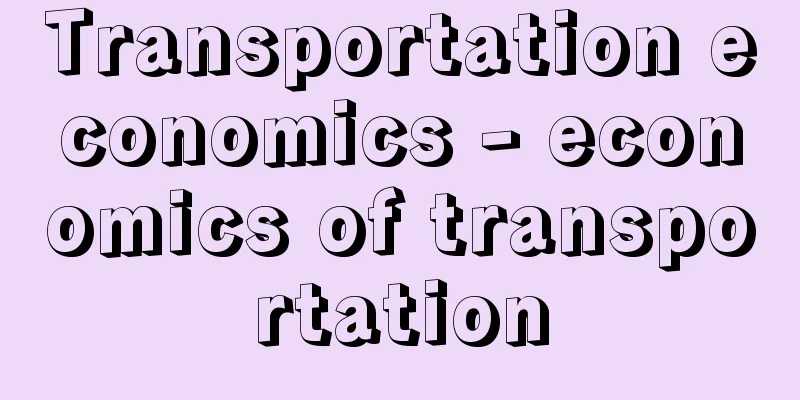Transportation economics - economics of transportation

|
A field of applied economics that uses economic methodology to elucidate various transportation-related phenomena and to evaluate and propose policies based on the results. It generally takes a microeconomic approach. In Japan, transportation-related courses were often offered in university commerce departments as part of logistics and insurance before World War II, under titles such as Land Transport Theory and Maritime Transport Theory. However, with the rapid development of economics after the war, transportation-related research fields quickly became closer to economics, and today, just as transportation theory-related courses are offered in commerce and management faculties, transportation economics and other transportation-related courses are offered in economics faculties. Transportation issues have been recognized in economics for a relatively long time, and A.C. Pigou, the father of welfare economics, took up various railway-related issues as examples of analysis in economics in his 1920 book Welfare Economics. The main research subjects of transportation economics are diverse, including fares, transportation regulations (public intervention), investment, and subsidies. Specific examples include fare levels and fare systems from the perspective of efficiency and fairness, price regulations and entry regulations in the transportation market, policy analysis to alleviate congestion issues, investment effect analysis (cost-benefit analysis, etc.), internal subsidies in transportation networks, and ensuring transportation services on quiet regional routes. In addition, since there is a wealth of transportation statistics, quantitative analysis of transportation data using econometric methods is also actively conducted. Transportation is closely related to urban economics and regional economics, as it is related to urban planning and regional development. And because transportation has long been subject to state regulation, it is also closely related to public economics and industrial organization theory from the perspective of public intervention and industrial policy. In addition, because environmental issues related to transportation are also considered important, it is also related to environmental economics. Furthermore, transportation is also related to business administration from the perspective of transportation company management, and is also related to logistics. [Kenzo Takeuchi] "Transport Economics" by Hirotaka Yamauchi and Kenzo Takeuchi (2002, Yuhikaku) " "Development of Transport Economics" by Takuya Eto (2003, Chikura Shobo) " "Introduction to Transport Economics" by Kenzo Takeuchi (2008, Yuhikaku) [References] | | | | | | | | |Source: Shogakukan Encyclopedia Nipponica About Encyclopedia Nipponica Information | Legend |
|
経済学の方法論を使用することによって、交通に関する諸現象の解明と、それに基づく政策評価や政策提言を行う応用経済学の一分野。ミクロ経済学からのアプローチが一般的である。日本における交通に関する講座は、第二次世界大戦以前より物流や保険に関する一領域として、陸運論、海運論などの科目名で、大学の商学部系統に置かれることが多かった。しかし、戦後の急速な経済学の進展により、交通に関する研究領域は急速に経済学と接近し、現在では商学部や経営学部において交通論関係科目が置かれているのと同様に、経済学部において交通経済学をはじめとした交通に関する科目が設置されている。 経済学における交通問題の認識は比較的古く、厚生経済学の始祖といわれるA・C・ピグーは、1920年の『厚生経済学』において、鉄道に関するさまざまな問題を経済学における分析の事例として取り上げている。交通経済学のおもな研究対象は、運賃をはじめとして、交通に関する規制(公的介入のあり方)、投資、補助など多岐にわたる。具体的な例をあげると、効率と公正の観点からみた運賃水準や運賃体系のあり方、交通市場への価格規制や参入規制のあり方、混雑問題緩和のための政策分析、投資効果分析(費用・便益分析など)、交通ネットワークにおける内部補助のあり方、地方閑散路線の交通サービス確保のあり方などがある。また交通に関する統計が豊富であることから、計量経済学の手法を用いた交通データの計量分析も盛んに行われている。 交通は都市計画や地域開発などにも関係することから、都市経済学、地域経済学との関係が深い。そして、昔から国家により規制の対象とされてきたこともあって、公的介入や産業政策の視点から、公共経済学、産業組織論などとの関係も深い。また、交通に関する環境問題も重要視されていることから、環境経済学との関連もある。さらに、交通企業経営という観点から経営学との関連もあり、ロジスティクス(物流)との関係もある。 [竹内健蔵] 『山内弘隆・竹内健蔵著『交通経済学』(2002・有斐閣)』▽『衛藤卓也著『交通経済論の展開』(2003・千倉書房)』▽『竹内健蔵著『交通経済学入門』(2008・有斐閣)』 [参照項目] | | | | | | | | |出典 小学館 日本大百科全書(ニッポニカ)日本大百科全書(ニッポニカ)について 情報 | 凡例 |
Recommend
Volynka
…The zhaleika is a single-reed instrument, so nam...
Kidd, B.
...However, historically, the distinction between...
Priestly Source
…Both are considered to have been produced as off...
Aviation accident - koukujiko
This refers to damage to persons or property caus...
Kanto Onkuji - Kanto Onkuji
Although it is sometimes used synonymously with t...
Emperor Gohanazono
Year of death: Bunmei 2.12.27 (1471.1.18) Year of ...
Dunstable, John
[Born] about 1385. Dunstable? Died: December 24, 1...
Aluminium Limited [company] - Aluminium Limited
…Alcan's history began in 1928 when it separa...
Hinoeuma - Hinoeuma
This is a popular belief that developed from the ...
Mantaro Kubota
Novelist, playwright, haiku poet. Born in Tokyo o...
Felis lynx canadensis (English spelling) Felislynxcanadensis
…[Yoshinori Imaizumi]. … *Some of the terminology...
Eurystheus
… On the day that Zeus was to give birth to Alkmē...
Oreiades - I'm Oreia
...The famous Echo was unrequited love for the be...
Shoin - Shoin
〘 noun 〙 (meaning a place where books are collecte...
War correspondent - jugunkisha
A journalist is a person who is sent to the battl...









